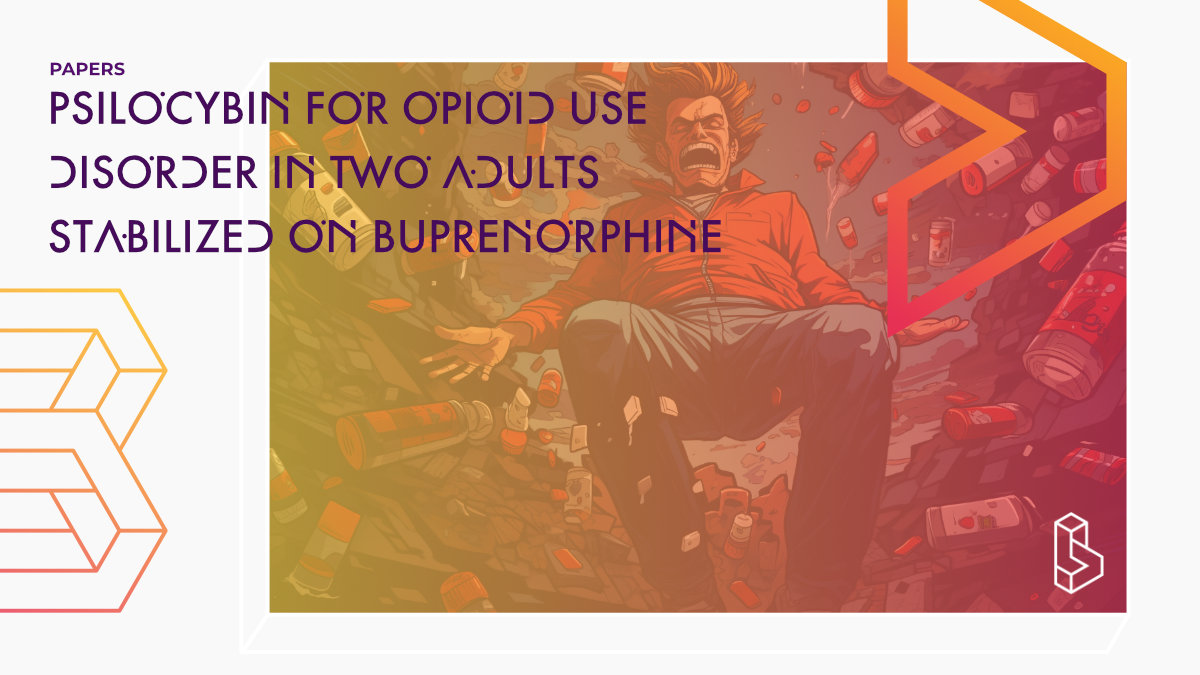This safety-feasibility trial (n=2) explored the interaction between psilocybin and buprenorphine in adults with opioid use disorder (OUD). The study found that coadministration of psilocybin and buprenorphine was safely tolerated, with no serious adverse events or significant changes in opioid craving or withdrawal measures. Feasibility challenges led to modifications in the study population and eligibility criteria, emphasizing the need for improved accessibility and overall generalizability.
Abstract of Psilocybin for Opioid Use Disorder in Two Adults Stabilized on Buprenorphine
“Background: Psilocybin has demonstrated promising clinical outcomes for nicotine and alcohol use disorders, yet its potential clinical utility in the treatment of opioid use disorder (OUD) remains unreported in modern literature. This technical report presents methodological considerations and preliminary data from a safety-feasibility trial examining the interaction between psilocybin and buprenorphine in two adults diagnosed with OUD.
Procedures: Two adults meeting eligibility criteria for long-term stabilization of buprenorphine/naloxone (≥6 months) enrolled and underwent two psilocybin dosing sessions in a supportive setting. Preliminary data pertaining to the safety, clinical outcomes, and subjective effects of psilocybin were collected.
Main Findings: Two participants received psilocybin and completed all study visits. Feasibility considerations were identified, including limitations in provider-based recruitment strategies, participant accessibility, flexibility of the study schedule, and initial eligibility criteria. There were no serious adverse events or significant baseline changes on measures of opioid craving or withdrawal, and the subjective effects associated with psilocybin were consistent with previous studies.
Principal Conclusions: Coadministration of psilocybin and buprenorphine was safely tolerated and did not demonstrate contraindicating effects vis-à-vis effectiveness of buprenorphine or the subjective effects of psilocybin. Challenges in feasibility led to modifications in the sample population and eligibility criteria and strategies to improve accessibility, minimize burden, and enhance overall generalizability.”
Authors: Christopher R. Nicholas, David M. Horton, Julia Malicki, Amelia Baltes, Paul R. Hutson, & Randall T. Brown
Find this paper
https://doi.org/10.1089/psymed.2023.0012
Paywall | Google Scholar | Backup | 🕊
Cite this paper (APA)
Nicholas, C. R., Horton, D. M., Malicki, J., Baltes, A., Hutson, P. R., & Brown, R. T. (2023). Psilocybin for Opioid Use Disorder in Two Adults Stabilized on Buprenorphine: A Technical Report on Study Modifications and Preliminary Findings. Psychedelic Medicine.
Study details
Compounds studied
Psilocybin
Topics studied
Opioid Use Disorder
Addiction
Study characteristics
Case Study
Participants
2
Humans
Linked Clinical Trial
Psilocybin for Opioid Use Disorder in Patients on Methadone Maintenance With Ongoing Opioid UseThis study will investigate whether psilocybin administered under supportive conditions can reduce illicit opioid use and improve quality of life in individuals with Opioid Use Disorder (OUD) in Methadone Maintenance Treatment (MMT) who are concurrently using other opioids illicitly.

